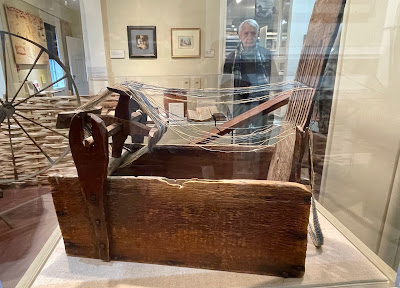By Kimberly Alexander, Director of Museum Studies
At the end of the fall 2023 semester, I organized a special tour for UNH Museum Studies class and the Flax Team to the Counting House Museum at the Old Berwick Historical Society. The tour was led by the OBHS curator, Ruth Greene-McNally, and guest curators, renowned material culture and historic textile specialists, Peter and Nancy Cook. The OBHS staff and exhibition team were extremely generous with their time and knowledge. We hope to return during the spring 2024 semester.
About the exhibition:
Material Culture: Domestic Cloth-Making in 18th Century New England
The Counting House Museum's 2022 exhibit explores the material culture of early domestic textile arts and the tools used to produce linen and woolen cloth in rural New England homesteads. Material goods provide a window into standards of living, self-sufficiency, economic diversification, and the transition from frontier life to settled communities. The specialized tools used to process flax and wool, and the spinning wheels and looms on display, reveal the necessary individual skills and the collaborative family roles in creating yarn and cloth.
Loans from the collection of Guest Curators Peter and Nancy Cook and selections from the permanent collection of the Old Berwick Historical Society reflect the art of creating homespun textiles in common use throughout the 18th century. This exhibit will be on display for the 2023 season, with a possible extension into 2024.
 |
Bartlett Bed Hangings, Five Valances, and Headcloth Unidentified maker, Londonderry, NH 18th century Linen cloth and fringe Courtesy of Peter and Nancy Cook |
The OBHS Board of Directors gratefully acknowledges the support of several individuals for their contributions to the development of Material Culture: Domestic Cloth-Making in 18th-Century New England:
Hollis Brodrick, Lender
Randi Ona, Lender
Paul and Pat Boisvert, Lenders
Melody English, OBHS Archivist
Harrison English-Yonan, OBHS Archivist
Norma Keim, OBHS Archivist and Office Manager
Wendy Pirsig, OBHS Archivist and Board President, Emeritus
Jane Orr, OBHS Board Treasurer, Proofreading
Jane McDonnell, Gallery Renovation
George McNally, Gallery Renovation
Rich Cunningham, Gallery Renovation
Dave Lurvey, Gallery Renovation
Philip C. Carling, MD, Custom Rare Book Boxes and Cradles
Andy Ritzo, Trompe l'oeil faux finish
Christina Nancarrow-Wilson, OBHS Archivist, Curatorial Assistance
Jessica Elsmore, Photography
Rachel Zoll Schumacher, Graphic Design
Larry Hayden, Preparator
John Demos, OBHS Archivist, Gallery Renovation and Installation
Ruth Greene-McNally, OBHS Curator





















